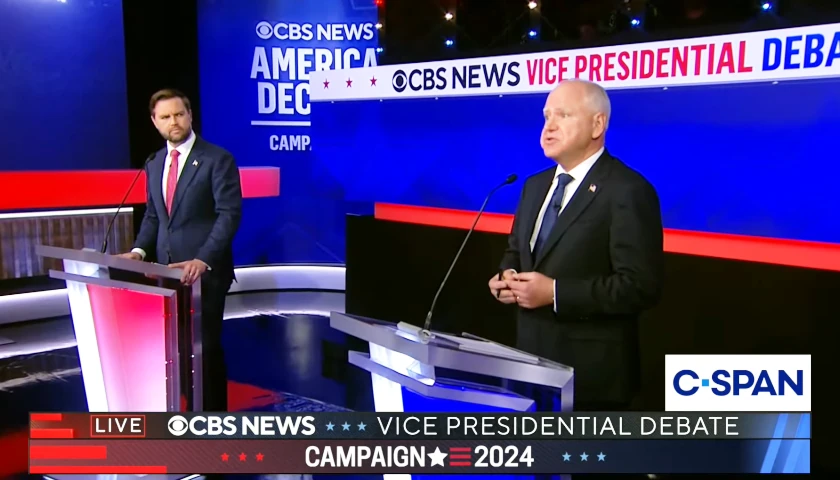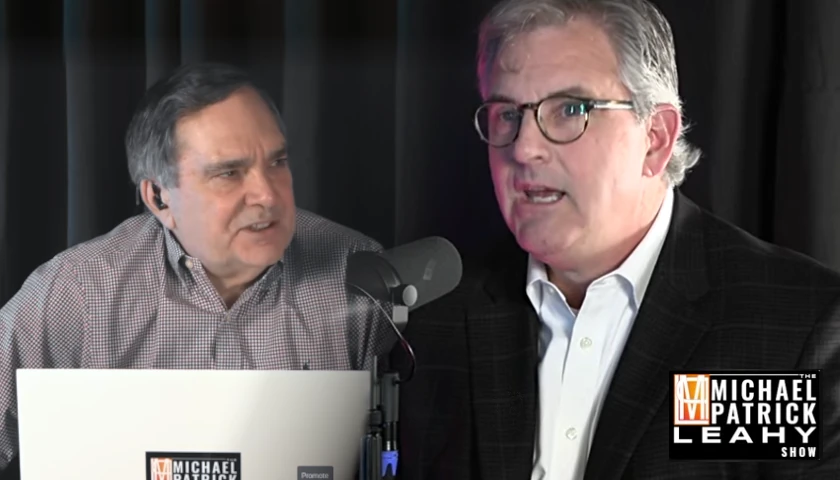Live from Music Row Tuesday morning on The Tennessee Star Report with Michael Patrick Leahy – broadcast on Nashville’s Talk Radio 98.3 and 1510 WLAC weekdays from 5:00 a.m. to 8:00 a.m. – host Leahy welcomed the Executive Director & CEO of Professional Educators of Tennessee, JC Bowman in studio to talk about their organization and the failed Achievement School Districts concept.
Leahy: We are joined in studio now by our very good friend JC Bowman, the President of Professional Educators of Tennessee and one of the original contributors to The Tennessee Star. Good morning, JC.
Bowman: Good morning. How are you doing, Michael?
Leahy: I’m delighted to have you. This is the first time you’ve been in studio with us, isn’t it?
Bowman: Oh, yeah, absolutely.
Leahy: Kind of fun, isn’t it?
Bowman: Oh, yeah, it’s great, too. And you really have a good show. So I appreciate the opportunity to be here.
Leahy: Now talk about the beginnings of The Tennessee Star. We will be celebrating our fifth anniversary on February 7th. And do you know who wrote the very first commentary at The Tennessee Star? It was you, JC Bowman.
Bowman: Wow. It’s been five good years.
Leahy: We think so. We think so.
Bowman: And you’ve certainly captured that niche out there that people are looking for.
Leahy: You mean truth, justice, and the American way? (Laughs)
Bowman: Yeah. But I think honestly, there’s certain people that you want to pick up and read every morning so when you do that, clearly you’re looking at that. And your paper certainly has now become among legislators and particularly policymakers, a must read.
Leahy: Now what’s interesting, JC, is almost five years later you have another commentary for us today. We’ll talk about that in a moment. It’s a commentary on school funding, vouchers, and the ASD. What’s ASD stand for?
Bowman: The Achievement School District.
Leahy: Oh, yeah. We’ll talk about that. Sometimes things get names that just are exactly the opposite of what they really are. Achievement School District. But let’s tell our listeners about what is Professional Educators of Tennessee and how are you different from the teachers union?
Bowman: A couple of things. And it used to be when we started out, Professional Educators of Tennessee was started in the late 19s70s. But it didn’t really incorporate till 1991.
But we’ve been in existence for a long time and we started out truly as an alternative to the NEA. And they had an agenda that really wasn’t beneficial to classroom teachers.
Leahy: That’s a key point, isn’t it?
Bowman: Yes. They boycotted coffee and I mean, we don’t have coffee by gosh, we’re going to war. (Leahy laughs) I was in the Marines and there was a thing that they had because of the way they treated coffee workers or something which had no bearing on the classroom. And where we need to tell a teacher they can’t have coffee. Those are almost fighting words.
Leahy: They are fighting words, especially in this studio or out as we enter the studio.
Bowman: Yeah, absolutely.
Leahy: We drink coffee.
Bowman: I brought donuts today to celebrate.
Leahy: I like donuts, too.
Bowman: So a couple of things, but we’re there, but we’ve kind of morphed into even more. I mean, we offer probably twice as many benefits as the union.
Obviously, we have more liability protection for our teachers. And so we’re actually moving on. And obviously, we’re there to advocate for teachers. We do advocate for children. The dyslexia bill we wrote in 2016, which is probably one of the first articles we worked on.
Those kids were not getting funded! And that bill came because classroom teachers wanted to help children and were being told they couldn’t do it.
Leahy: You’re on the web Proedtn.org. How many teachers in Tennessee are associated with Professional Educators of Tennessee?
Bowman: Now we’re over 8,000.
Leahy: Really? You’ve been growing.
Bowman: And we keep growing. We like to tell people another publication always puts in the union as being the largest association in the state. And I called their attention.
I said they’re also the fastest declining association in the state and we’re the fastest growing. (Leahy chuckles) But again, it’s not about them, but it’s about us, really. I don’t react to their agenda. We go and do our own thing so they can do theirs.
(Commercial break)
Leahy: Why did we wait five years to have you in studio?
Bowman: I don’t know. I guess it’s a lack of donuts.
Leahy: Lack of donuts. You have the donuts. We’re going to have you here in more often. This very fascinating commentary about school funding vouchers and the ‘achievement school districts.’ Talk a moment about the idea of achievement school districts and the reality of achievement school districts.
Bowman: Number one, I think it’s one of the most colossal failures that this state has ever done, and everybody knows it.
Leahy: What do you really think, though? (Laughs)
Bowman: I mean, it has absolutely been a scourge. Even Cameron Sexton, Antonio Parkinson, to his credit.
Leahy: He’s a state representative, Democrat from Memphis.
Bowman: He has absolutely been on this thing. And he has talked about it.
Leahy: For our listening audience, what is an Achievement School District?
Bowman: Number one, they combined it so they could bring schools in. They went out after pockets of failure, both in Nashville and Memphis.
Leahy: When did this thing get started?
Bowman: It started under Race to the Top.
Leahy: When was that?
Bowman: Race to the Top in 2010 under President Obama.
Leahy: Under President Obama.
Bowman: This is a federal program. They got $501,000,000. They created a program to deal with chronically failing schools.
Leahy: Okay. There are some so they identified chronically failing schools in where?
Bowman: Mainly in Memphis, Memphis and Nashville.
Leahy: Okay. Chronically failing schools in Memphis and Nashville. The feds give us $500 million to have these achievements school districts to do what?
Bowman: It may have been $500 billion excuse me.
Leahy: It’s a lot of money. So it’s a big number.
Bowman: Yes. $501 billion.
Leahy: They give all this money. And so what happens then next? Do they take over the school district? They came in and they took over the schools and they gave some of the schools to charters. But they would bid them out and they would let charter schools come in and take over certain schools.
Leahy: And how did they do?
Bowman: They did not perform well. They performed actually below the district standards. But here’s the key part that really I focused in on.
There was a number of schools that nobody wanted. They said, we don’t want these four schools. So the state said, okay, we’ll manage them. That’s where the numbers are.
Leahy: Okay. So let’s talk about so the state. These are four really bad school districts in Memphis.
Bowman: Memphis. Four really bad schools.
Leahy: Four really bad schools in Memphis. How does that work? Do they have, like, a state employee called the principal of school A or B?
Bowman: That would be the nice thing. But now they have the director of the Achievement School District. It’s the equivalent of a Superintendent. They have principals at each school. They have a bureaucracy established at the State Department.
Leahy: And so does this director, like, go down to the school and work with the schools?
Bowman: They’re supposed to, but they mainly resided here in Nashville and ran the schools in Memphis.
Leahy: And did what? Oh, that’s going to work! (Chuckles)
Bowman: And that was Antonio’s take on it a little bit. If you’re going to be in the community, be in the community. Don’t tell us from Nashville how to run Memphis. There’s a sense of that.
And the other problem that I would have and I would argue it bigger is that the problem wasn’t four schools in Memphis or twelve schools or 22 schools. The problem in Memphis is the whole school system! Shelby County Schools…
Leahy: They’re at the bottom of the bottom.
Bowman: But again, Where’s the accountability at? Well, here’s the bottom of the bottom. But think about this. 16 percent of the kids and the numbers that they released for the next year is like 11 percent of the kids are on grade level.
Leahy: 11 percent?
Bowman: Yes.
Leahy: Is that for all of Shelby County?
Bowman: Yes. So here’s where it gets better. It was 16 when I was playing with the numbers. But then the state run schools were at six percent.
Leahy: At six percent?
Bowman: Yes.
Leahy: How could you run the school that poorly?
Bowman: That would be the million dollar question. Here’s a couple of things. They number one, didn’t have enough teachers.
We have a teacher shortage in Tennessee. I don’t care what anybody says, I mean, look at. 400 openings in Metro Nashville, 300 teachers are sick. Generally speaking.
Leahy: You and I probably have a little disagreement with this. My personal view is that I think that K12 public education is an unsolvable disaster. That’s my personal view.
But I will say this: If you look at public school teacher salaries and you compare a state like Texas and particularly the independent school districts in the North Dallas area, and you compare their starting salaries to the starting salaries here, there is a huge differential. I think they’re starting salaries like $55,000 down in those school districts in Texas. What is it here?
Bowman: $37,000. And we start correction workers. That was the other thing I’ve done. And correction workers, Governor Lee has decided, are going to start at $45,000 and they don’t even have to have a degree.
Leahy: Let me just say, generally speaking, the job of a teacher to be able to do a good job, whether you’re paid by a private school or whether you’re paid by a public school, that job does require probably a starting salary in the $55,000 to $60,000 range it would seem to me if you want to get somebody who’s really good.
Bowman: And we can do that if we get rid of the bureaucracy. (Leahy laughs) We’ve got a bureaucratic system. Here’s the thing, Michael. This is where I went on with the other stuff as we hire these. The big argument that we’re reducing the size of state government.
You and I both love that. But guess what we’re doing? We’re hiring consultants that we don’t even know. We’re putting in contracts and grants and bringing God knows who and do what from whatever state they want to come into. I mean, you drive by Tennessee and they’ll throw at the Department of Education and you got an outstanding…
Leahy: The flyover Tennessee. They’ll reach down, they’ll grab in a multimillion dollar contract and say thank you very much.
Bowman: Congratulations. You’re an education expert, by the way.
Leahy: Just as an aside, this is funny. You saw that the Nashville Post has filed a Freedom of Information Act request to get a copy of a $3 million contract that the state had with McKinsey, the big global international consulting firm, and the state has refused to provide it, forcing them to file a lawsuit. The claim was it was a violation of wait for it. The deliberative process privilege. I never heard of that.
Bowman: No.
Leahy: They made it up out of thin air, I think.
Bowman: Well, and that’s what’s happening at the State Department. And you don’t blink. If a teacher makes $40,000 a year and God forbid, fails to turn in a check that they got from a parent for lunch, they’re going to lose their job and they’re going to get deemed and get written up and everything else.
Leahy: You’re saying it’s not a well run operation.
Bowman: And I have to say this. After we talked, yesterday, we had two two teachers that were assaulted and a teacher’s aide was beaten by student in the Clarksville School District. But I’m going to say this. This student has hit at least five other teachers. These teachers are punching bags by
Leahy: What has happened with that student?
Bowman: They’re having a hearing today. But the bottom line is we’re seeing it time against the most underreported thing.
Leahy: Assault on teachers.
Bowman: Assault on teachers.
Leahy: And this whole little TikTok craze hasn’t helped, has it?
Bowman: No. Our teachers are in a war zone. And I know that we have some folks that take advantage of it, manipulate it. I’m not saying everybody’s perfect.
We’ve got curriculum that we’ve adopted that we need to take a look at. But that is like laser pointers to a cat. The big thing we got to look at.
Leahy: Laser pointers to a cat. I like that phrase.
Bowman: Where’s the money from the funding program? We’ve needed to modernize our funding system for a long time, no doubt. For 30 years we used the BP formula. Basic education program.
Leahy: Which is the least comprehensible funding system that I’ve ever heard of.
Bowman: But here was the interesting part to that. Let me say this, though. The BDP is a child-centered funding model. So you can run around and go, “Hey, we’re creating a child-centered funding model.” That sounds great. How is BP not a child-centered funding model?
Leahy: So let me just stop for a moment. Governor, Bill Lee, and Education Commissioner Penny Schwinn have conducted this little PR event. They’ve gone around the state. They had one event in Nashville on Wednesday where they have a, ‘public hearing’ about this funding formula.
And basically, from what we can tell in our reporting, we’ve reported on many of these, it looks like most of the people there that testify are teachers.
And the bottom line is the message that they’re getting is simply not necessarily money following the student, but rather, let’s just give us more money. I think this is just a PR effort to get more money into education that the Penny Schwinn can spend where she wants.
Bowman: Somewhat. Here’s the thing that The Tennessean reported on.
Leahy: The Tennessean?
Bowman: Do we say that here?
Leahy: Well, we can say that, but who are they? Where are they from? Where are the reporters from?
Bowman: I don’t know. But I have to tell you, Megan Mangrum did a great job on her article, and she outlined that over $500,000 came into the state to push a new school funding model for the state of Tennessee.
Leahy: And who gave the $500,000?
Bowman: Bill Gates.
Leahy: Bill Gates, because he knows so much about Tennessee.
Bowman: The Bill Gates Foundation. Well, he spends a lot of money here. He has given state collaborative on reforming education.
Leahy: JC Bowman, that’s it for today. Can you come back?
Bowman: I’ll come back anytime.
To learn more about Professional Educators of Tennessee visit them on the web at Proedtn.org
– – –
Tune in weekdays from 5:00 – 8:00 a.m. to the Tennessee Star Report with Michael Patrick Leahy on Talk Radio 98.3 FM WLAC 1510. Listen online at iHeart Radio.





